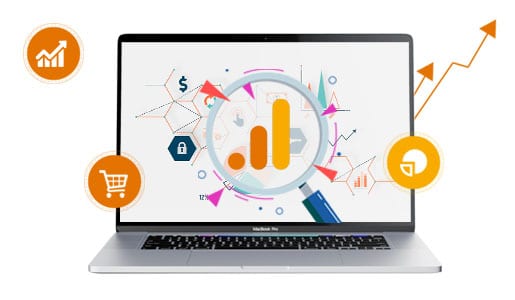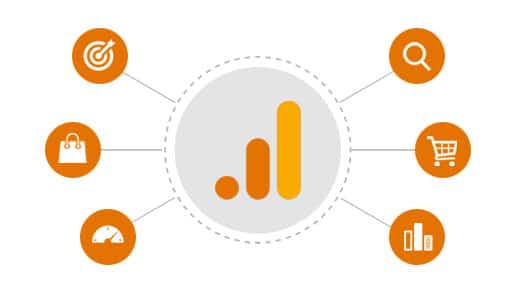
Google Analytics 4 (GA4) is replacing Universal Analytics. Starting July 1, 2023, Universal Analytics (UA) is going to stop processing data in standard properties. So, what does this mean for eCommerce store owners? Or, how it is going to affect the eCommerce websites?
Let’s dive in.
In this blog post, we will provide an overview of UA, GA4, how GA4 is different from UA, the benefits of switching to GA4 for eCommerce store owners, and more.
1. Universal Analytics: Understanding It

Before delving into GA4 and why it’s going to be important for eCommerce stores, let’s give you a quick recap of Universal Analytics.
Universal Analytics (UA) is a previous-generation tool for measuring website traffic. It empowers eCommerce store owners to analyze traffic trends, measure user behavior, and gain a deep understanding of site usage.
1.1. What does this mean for eCommerce stores?
Basically, with the help of UA, eCommerce store owners get the chance to evaluate the performance of their website and optimize eCommerce marketing strategies to enhance the overall user experience and boost sales.
Plus, with comprehensive tracking capabilities, Universal Analytics offers essential data and insights required by store owners to make informed decisions, while enhancing the overall performance of an eCommerce store. This in turn drives higher conversions and revenue.
But with Universal Analytics 360 coming to an end on 30th June 2023, eCommerce stores should start migrating to Google Analytics 4 ASAP.
Now, let’s look at what makes Google Analytics 4 so important.
2. Why is Google Analytics so Important?

According to Web Technology Surveys, 56.5% of websites use Google Analytics for analyzing traffic to their websites. The rest of them use other types of traffic analysis tools, like Baidu Analytics, WordPress Jetpack, Hotjar, and more.
(Source: Web Technology Surveys)
Google Analytics is an indispensable tool for eCommerce store owners. With this tool, online store owners have a better understanding of their customers and easily analyze their behavior.
Basically, with the insights that GA4 offers, eCommerce store owners can devise strategies for improving customer experiences that will boost sales. Plus, it helps them get a better insight into website traffic, site usage, the way customers interact with the brand, and their associated actions.
So, if you are an eCommerce store owner and still using Universal Analytics, it’s time to upgrade to GA4.
2.1. Embrace GA4 for Future-Proof Analytics
Last year Google announced that GA4 is going to be “the next generation of analytics” tool and the “future of measurement”.
In the ever-evolving digital landscape, the tools used for understanding or measuring an eCommerce store’s performance should also improve. Recognizing this need, Google Analytics 4 makes an entry.
Google has completely revolutionized its Analytics reporting platform with the introduction of Google Analytics 4 (GA4).
This powerful tool harnesses advanced machine-learning technology, providing invaluable insights and a holistic view of customer interactions across devices and platforms.
With an emphasis on privacy, GA4 ensures accurate data collection even amidst evolving cookie limitations and user identifiers.
3. Why make the GA4 Switch early?
As an eCommerce store owner, if you start using GA4 now, you will get a competitive edge over others who are yet to migrate to Google Analytics 4.
Wondering how? Read on.
Firstly, it will set the stage for online stores to build a wealth of data with GA4, a completely new analytics platform.
Secondly, with the sunset of Universal Analytics (GA3), Google Analytics 4 is going to become the default platform Google Analytics 4 (GA4) for collating and analyzing website data.
This means after July 1, 2023, eCommerce store owners won’t get any new data from UA properties. For obtaining new website data, GA4 is the only option.
But that’s not all.
Thirdly, the previously processed data properties from UA are going to remain accessible for the stipulated time for store owners. After the given period, the whole of Universal Analytics will come to an end. To prevent the loss of any data, making the switch early is going to help store owners from losing valuable reports or data.
So, before UA takes retirement, don’t forget to migrate to GA4, and ensure exporting all historical data/reports from Universal Analytics before you lose access to the UA account.
In case you need any assistance with exporting the reports, taking the help of digital marketing experts is highly recommended.
4. Why Universal Analytics Is Getting an Upgrade?
Google Analytics 4 (GA4) is all about future-proofing the analytics strategy. With the gradual phasing out of third-party cookies on Chrome browsers, GA4 becomes crucial in filling the gaps left by this tracking technology.
It’s important to note that Google Analytics 4 is a distinct tool from its predecessor, GA3 or Universal Analytics. To ensure accessibility while retaining essential features, Google has updated the infrastructure.
The new Analytics has been designed to adapt to the evolving technology landscape, no matter whether cookies or identifiers are present or not. It takes a flexible approach to measurement and employs modeling techniques to compensate for potential gaps in data. This adaptability is what sets GA4 apart.
5. Is It Imperative to Set Up GA4?
One question might arise: Why is it imperative to set up Google Analytics 4 promptly?
Well, GA4 introduces an entirely new analytics model, which necessitates businesses to back up their historical data before the transition to the new analytics properties starts on July 1st, 2023.
To ensure a seamless transition for your business, it’s crucial to familiarize yourself with the new data model and dashboard without delay.
By embracing GA4 early on, you can stay ahead of the curve and make the most of its advanced capabilities.
Start the process of setting up GA4 now to ensure a smooth transition and maximize the potential of your eCommerce analytics.
Now, another question that might strike the mind of eCommerce store owners: will their business get affected if they don’t migrate to Google Analytics 4?
To answer that question, read the rest of the blog post.
5.1. Importance of Migrating to GA4
As the deadline for migrating to Google Analytics 4 (GA4) approaches, it’s crucial for businesses to understand the implications of not making the switch.
While the Analytics setup assistant can automatically create a GA4 property for your website or app, it’s important to note that historical data from Universal Analytics (UA) properties won’t be imported automatically.
This means eCommerce store owners are going to miss valuable opportunities for customization and lose critical year-over-year (YoY) insights.
Let’s explore the consequences of not migrating to GA4.
5.1.1. Missed Customization Opportunities
By not creating a GA4 property before the early 2023 deadline, businesses risk losing the chance to customize their analytics from the outset.
Although some configurations can be adjusted later, there will be gaps in data related to these customizations. To ensure comprehensive data capture and customization options, it is essential to migrate to GA4 before the deadline.
5.1.2. Loss of Year-over-Year Insights
The deadline for enabling YoY reporting in GA4 has already passed (June 30th, 2022). Businesses that haven’t set up their GA4 property or backed up their historical data will likely miss out on crucial YoY insights.
This loss can be significant, especially for highly seasonal businesses relying on accurate reporting. Migrating early ensures the preservation of valuable YoY data and insights in GA4.
Migrating to Google Analytics 4 (GA4) is not just a technical obligation but a strategic necessity. By neglecting to migrate, businesses risk missing out on valuable customization opportunities and losing critical year-over-year insights.
To harness the full potential of GA4, it’s crucial to create a GA4 property before the deadline, ensuring comprehensive data capture and the ability to customize analytics.
Now, let’s take you through the advantages of migrating to Google Analytics 4.
6. Benefits of Google Analytics 4 for eCommerce Store Owners

In the fast-paced world of eCommerce, staying ahead of the game requires leveraging insightful data to make informed decisions. Google Analytics 4 (GA4) emerges as a formidable ally for eCommerce store owners, offering a suite of advantages that can revolutionize their online business strategies.
Let’s explore how GA4 can subtly elevate your eCommerce game.
6.1. Better Accuracy: Empowering Informed Decision-Making
GA4’s data model, driven by machine learning, unlocks a new level of accuracy in delivering actionable insights. Reliable and up-to-date data allows businesses to make data-driven decisions with confidence.
By harnessing GA4’s accurate insights, eCommerce store owners can optimize their performance, identify trends, and cater to their customers’ evolving needs, ultimately enhancing the user experience.
6.2. Better Data Privacy: Safeguarding Customer Trust
Data privacy is of paramount importance in today’s digital landscape. GA4 understands this concern and offers enhanced data privacy and security features.
By providing businesses with better control over their data, GA4 empowers them to follow regulations like GDPR (General Data Protection Regulations). This ensures the protection of customer data, fostering trust and long-term relationships with your valued clientele.
6.3. Better Cross-device Tracking: Understanding the Customer Journey
In the era of multiple devices, GA4’s advanced cross-device tracking capabilities prove invaluable. By gaining a comprehensive overview of customers’ online journeys, businesses can understand their preferences, behaviors, and touchpoints.
Armed with this knowledge, eCommerce store owners can make informed decisions on engaging customers at the right time and in the right way, fostering stronger connections and driving conversions.
6.4. Advanced eCommerce Tracking: Perfecting Sales Strategies
Measuring the success of online sales efforts is paramount for eCommerce store owners. GA4’s advanced eCommerce tracking simplifies this process, providing comprehensive metrics and insights.
From conversion rates to product performance, GA4 equips businesses with a holistic view of their online sales landscape. Armed with this valuable information, eCommerce store owners can refine their strategies, optimize marketing campaigns, and drive higher revenue.
While these are some well-defined benefits of Google Analytics 4, let’s see what sets it apart from its predecessor.
7. Difference Between Universal Analytics (UA) and Google Analytics 4 (GA4)
As an eCommerce store owner, understanding the behavior and preferences of your online customers is vital for driving growth and optimizing your business strategies.
With the introduction of Google Analytics 4 (GA4), you now have access to a powerful tool that brings significant changes and benefits to your eCommerce journey.
Let’s explore how GA4 differs from its predecessor, Universal Analytics (UA).
Compared to its predecessor UA, GA4 offers:
7.1. Cookie-free tracking
GA4 is designed to work seamlessly across multiple platforms, cutting the reliance on device-based cookies for tracking user interactions.
This means that even when visitors decline cookie usage, you won’t lose critical data. By leveraging an event-based data model, GA4 ensures you still have access to trusted data to power your marketing campaigns and generate insightful reports.
7.2. Improved insights about the user journey
In the modern eCommerce landscape, user journeys are no longer linear. Customers may interact with your store through various devices and channels before making a purchase.
Unlike Universal Analytics, which may inaccurately attribute multiple sessions to one conversion, Google Analytics 4 provides a holistic view of the user journey by consolidating data from different devices.
This allows you to understand how visitors discovered your brand, where they engaged the most, and where they completed their purchases, enabling you to optimize your store accordingly.
7.3. Predictive insights
GA4 extends beyond traditional analytics by leveraging Google’s powerful machine-learning capabilities. By combining machine learning with structured event data, GA4 can predict the behavior of your consumers.
It offers insights such as purchase probability, churn probability, and predicted revenue. These predictive insights allow you to predict user actions, refine your marketing strategies, and proactively address gaps to achieve your growth targets.
7.4. Easy customer segmentation
Tracking user journeys across multiple devices can be challenging with Universal Analytics. However, GA4 simplifies this process by stitching together fragmented journeys.
This enhanced understanding of your audience enables you to build custom segments in GA4 and deliver targeted offers through Google Ads. By focusing your ad spend on the right audience, you can maximize the effectiveness and profitability of your campaigns, ultimately driving better results for your eCommerce store.
7.5. Custom funnels
While custom funnels were previously limited to Google’s premium analytics platform, GA4 brings this functionality to all users.
Custom funnels provide valuable insights into consumer behavior by identifying where potential customers are dropping off in the purchase journey.
This information empowers you to optimize specific stages of the funnel, reducing friction and improving conversion rates.
7.6. Export raw data
Google Analytics 4 offers the ability to export raw data, giving you greater flexibility to combine it with insights from other sources. By integrating GA4 data with external data sets, visualizing it in tools like Power BI and Tableau, and using it as input for machine learning models, you gain a more comprehensive understanding of your audience.
7.7. Better reporting
The frustration of slow-loading reports in Universal Analytics is a thing of the past. GA4 is built to ensure proper and seamless reporting, delivering data quickly and efficiently.
With improved accessibility to your data, you can make informed decisions in real-time, accelerating your business growth.
8. Important Features
As the digital landscape evolves, staying ahead requires leveraging advanced analytics tools. Google Analytics 4 (GA4) introduces powerful features that can revolutionize your eCommerce strategies. In this blog, we’ll explore three key GA4 features and their impact on your business.
8.1. Google Signals – Enhanced Cross-Device Reporting and Remarketing
Google Signals takes cross-device reporting and remarketing to new heights. By seamlessly integrating with Google Analytics, Signals provides a comprehensive view of user interactions across devices and sessions. Activating Google Signals allows for gathering valuable information, such as location, search history, and data from Google’s partner sites. This aggregated and anonymized data offers insights into cross-device behavior, enhancing advertising reporting capabilities.
8.2. Linking Google Ads – Streamlined Data Integration
Linking Google Analytics with Google Ads unlocks a wealth of valuable PPC metrics. Gain insights into cost, clicks, impressions, and more to inform your digital marketing strategy. The integration simplifies setting up conversion tracking, enabling the import of conversion events from Google Analytics. Establishing this integration is a quick and straightforward process, empowering data-driven decision-making.
8.3. User-ID Tracking – Comprehensive User Behavior Analysis
User-ID tracking in GA4 assigns a unique identifier to each user, enabling tracking across devices and sessions. This feature offers a holistic view of user behavior, revealing the complete journey on your website or app. Unlike in Universal Analytics (UA), session stitching complexities are eliminated, enhancing data accuracy. User-based metrics, such as lifetime value, provide deeper insights into user behavior, enabling better audience engagement strategies.
9. Google Analytics 4 Usage Statistics

The adoption of Google Analytics 4 (GA4) has seen a significant surge, with an estimated 8.4 million websites utilizing this advanced analytics platform as of March 2023. As a matter of fact, Google Analytics 4 (GA4) is changing the way businesses monitor the performance of websites.
9.1. Things to Know
Google Analytics 4 was officially launched on October 14, 2020, marking a new era in analytics.
The deadline for adopting GA4 is set for July 1, 2023, after which Universal Analytics will be deprecated, emphasizing the shift towards GA4 as the primary analytics tool.
Leveraging well-established analytical tools like predictive analytics, Google Analytics 4 offers robust capabilities to analyze and interpret data effectively.
As the deadline for GA4 adoption approaches, it’s crucial for eCommerce website owners using Magento or BigCommerce platform to leverage the power of this advanced analytics tool to gain valuable insights and drive informed decision-making for their digital success.
Professional Help
If you haven’t started to migrate your eCommerce store to GA4 yet, then it’s high time for you to make the transition as quickly as possible. If you don’t have the time to make the switch or don’t know the right way to do it, then you have nothing to worry about. We are just a call away.
Once you contact us, our professional eCommerce experts will guide you through the entire process.
Final Thoughts
Google Analytics 4 (GA4) is a game changer for eCommerce store owners, offering an array of advantages that can revolutionize their online business.
From correct and actionable insights to enhanced data privacy, and cross-device tracking to advanced eCommerce analytics, GA4 empowers businesses to thrive in the ever-evolving digital landscape. Embrace GA4’s subtle power, unlock its potential, and steer your eCommerce venture toward unparalleled success today.













